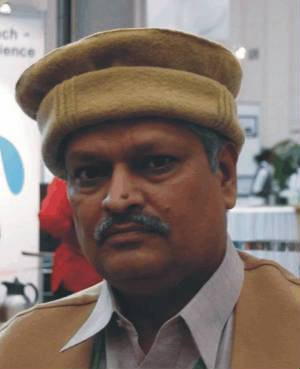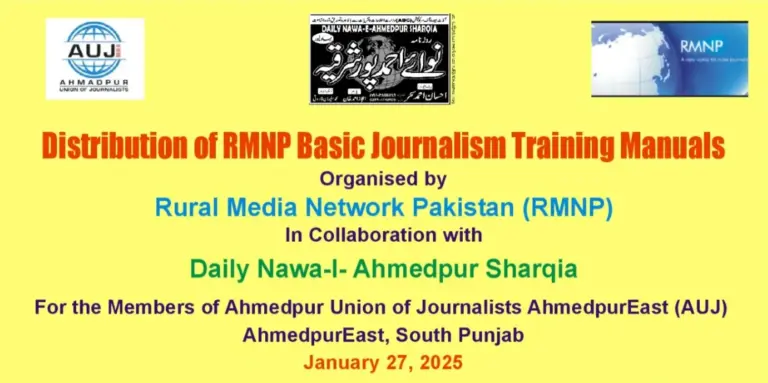DCMF hosts workshops in Pakistan
 Doha Centre for Media Freedom has recently conducted three workshops in Pakistan aimed at improving safety conditions and awareness for journalists who are carrying out their work in one of the most dangerous countries in the world for media workers.
Doha Centre for Media Freedom has recently conducted three workshops in Pakistan aimed at improving safety conditions and awareness for journalists who are carrying out their work in one of the most dangerous countries in the world for media workers.
The workshops have been conducted in conjunction with the Rural Media Network Pakistan (RMNP), as part of a series of six events concerned with the ‘Safety of journalists working in hostile environments in rural Pakistan,’ focussing on areas of the country which have witnessed numerous cases of journalists being targeted and threatened with violent attacks.
Journalists in Pakistan face some of the toughest working conditions in the world, especially those that work in the tribal, rural areas of the country.
Many are untrained, but they carry out work in areas of the country from where more established Pakistani journalists feel too unsafe to report.
As such, their work is invaluable and provides information and insight from a part of the world which would otherwise remain uncovered. Through their work alongside tribal leaders and religious extremists, it is no surprise that these media workers often find themselves in extremely difficult and dangerous situations.
President of the RMNP, Ehsan Ahmed Sehar explained that seven journalists have been killed in Pakistan over the past nine months, leading to Reporters Without Borders (RSF) and the Committee to Protect Journalists declaring the country one of the deadliest in the world for members of the media.
According to RSF: “These tribal areas are in fact the most dangerous places for journalists who work there, and frequently the motivations for these acts of violence are the perceived notions of defamation or blasphemy which Pakistan has refused to decriminalise.”
DCMF’s involvement
The constant dangers facing journalists in these rural areas, the need for responsible journalism and the importance of essential safety training were all factors in DCMF deciding to organise the workshops in Pakistan.
DCMF’s Senior Training Coordinator, Omar Makhfi explained: “With more than 1.000 dailies and nearly 200 FM radio and TV stations, Pakistan has one of the most vibrant media landscapes on the subcontinent. However, being a media worker in Pakistan is very challenging if not perilous, especially in rural and tribal areas. Hence our partnership with RMNP, an NGO with a very good record in media development, to implement safety workshops.”
“Journalists’ safety is one the pillars of DCMF’s mission and it is most needed in Pakistan. With RNMP, and through an anticipatory approach, we are trying to raise awareness about safety among media workers and provide them with the necessary knowledge to tackle difficult situations while reporting on issues in their communities,” he added.
Dangerous situation requires a lot of work.
RMNP”s Sehar explained that sectarianism and religious extremism pose serious threats to journalists who are forced to cover news and views in a certain way.
“In feudal dominated areas, rural journalists in Pakistan are usually unpaid and avoid reporting about feudal leaders,” he said, adding “if one dares to report against them they are either victimised with the collaboration of state machinery or they are threatened with the kidnapping of family members.”
“Religious extremists force journalists to cover their speeches against other sects and pressurise them into publishing news word for word,” he said.
“It has also been observed that in some places, rural journalists are working as puppets for feudal leaders who pay them money,” he added
“Reporters in rural areas are the backbone of newspapers and private TV channels – unless fully prepared to protect personal safety, they can’t play their professional role,” he argued.
Sehar noted that women often feel too intimidated to become journalists, meaning that the female perspective is almost entirely absent from reporting produced in rural areas.
However, he noted that the DCMF workshops provided a foundation for future work, and said he was pleased with the response they received.
“The response to the workshops has been encouraging. The participants have increased awareness of important issues and are now in regular contact with RMNP.
“They also learnt a lot of important information about how to report from dangerous situations and how to remain as safe as possible while doing their job,” he added.
Training
The workshops, which each took place over two days and featured around 15 journalists per event, taught participants about the importance of being careful when covering sensitive issues and of producing balanced reports using verifiable sources.
The trainers spoke about disaster reporting in detail, and told the attendees that it is important to maintain distance from religious groups and avoid publishing “hate speech.”
Participants were taught about reporting around bomb blasts and identifying possible booby traps, and were given first aid training to deal with medical emergencies.
The group also discussed the importance of the media in covering conflicts and provided knowledge of techniques for conducting efficient and safe conflict zone reporting.
Recommendations
Throughout the six workshops, a number of recommendations were made by the workshop attendees.
Special Assistant to Chief Minister Punjab Baligh ur Rehman reiterated the importance of journalists in holding government officials to account and uncovering corruption. Rehman and other attendees thanked RMNP and Doha Centre for Media freedom for organising the workshops and helping to provide journalists in Pakistan with the best safety knowledge and guidelines possible.
Member of the Pakistani National Assembly, Arif Aziz Shiekh announced that an amendment concerning freedom of the press and safety and security of journalists would be discussed in the upcoming meeting of the assembly in January 2013.
Attendees at the last workshop unanimously lauded the efforts of the young journalist, Malala Yousafzai and condemned the Tehrik e-Taliban for their attack on her.
They argued that more workshops should be organised to ensure that long term changes can be encouraged for the future of journalists in Pakistan.
Need for more protection
At one of the workshops, Rana M Aslam from Daily Pakistan and Ejaz Baloch, a correspondent for Daily Bolta Pakistan described their experiences of being threatened and detained by police and politicians as a result of stories they had published.
This was a common theme at each of the two-day events, as it became clear that experiences and stories like theirs occur all too often in Pakistan.
Reporting on corruption or crime will more than likely lead to abduction or threats, and journalists do not feel that they have the necessary protection to feel comfortable in following stories they wish to report.
Due to this climate of fear and impunity, the workshops organised by DCMF and RMNP were seen as a major boost to journalists in these areas, whose constant fight for media freedom is a clear indication of the need for more safety training and other precautions to be introduced.
Source: DCMF

